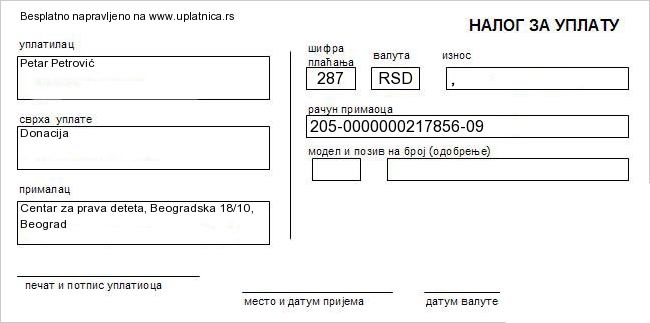
The Child Rights Centre expresses concern about the frequent reports of sexual violence against children in the economic entities that provide the services of informal education under different names – school, studio, centre, playroom, club and the like. In Serbia, there are a number of business entities performing activities with children and youth, which are not recognised by any system in a way that would ensure safety and protection of personal integrity, as well as the mental and health development of children. Furthermore, the curriculum and manner of their work, or the results they achieve, are not monitored or evaluated.
Informal education is important as much as formal. Informal education plays a significant role in the development of child interests, social skills and various competences, and therefore can be a quality complement to formal education. It is also important to mention that a number of these economic entities work in appropriate, primarily safe conditions for children and therefore, do not violate basic child rights.
What is worrying is the fact that it is not prescribed in what conditions the work of these economic entities should take place, given the specificity of the activity and the target group with which they work; what qualifications and competencies those who work with children should have, whether there is a plan according to which they work, what children are expected to learn and what competences to develop; who and in what way can monitor their work; whom and what types of information they give about their work; what consequences they should suffer if they work inappropriately, etc. Also, the description of the registered activities of some of these business entities do not even include education as such. When registering with the Serbian Business Registers Agency, these business entities should meet the same conditions as any other business entity when it comes to responsibility and safety, regardless of the fact that they work with a particularly vulnerable group – children and youth.
It is necessary to regulate this area by establishing a clear legislative framework governing the work with children and youth, enabling the monitoring of their work and prescribing a procedure in case of the violation of regulations. However, the basic characteristics (such as flexibility and openness to rapid change) of informal education that distinguish it from the formal one should be kept. It is necessary that all business entities working with children have a legal obligation to establish adequate standards and procedures for the protection of children from violence and sexual exploitation. In addition, training and awareness raising of those working with children play a major role in building an organisational culture of intolerance to violence and abuse. It would be important that relevant information on the work of these business entities be made available to the public, especially if there have been any complaints that have proved to well-founded.
It is extremely important to empower and inform children and youth about their rights and how they can protect their rights in case they are violated.
This area needs to be regulated for the benefit of children and youth and their parents/legal representatives, but also all those who work or plan to work with children, with the aim of respecting the rights of the child and eradicating all forms of violence against children, as pointed out by the UN Committee on the Rights of the Child to our country by recommendation no. 33 in its concluding observations adopted on 3 February 2017.
Media coverage:
